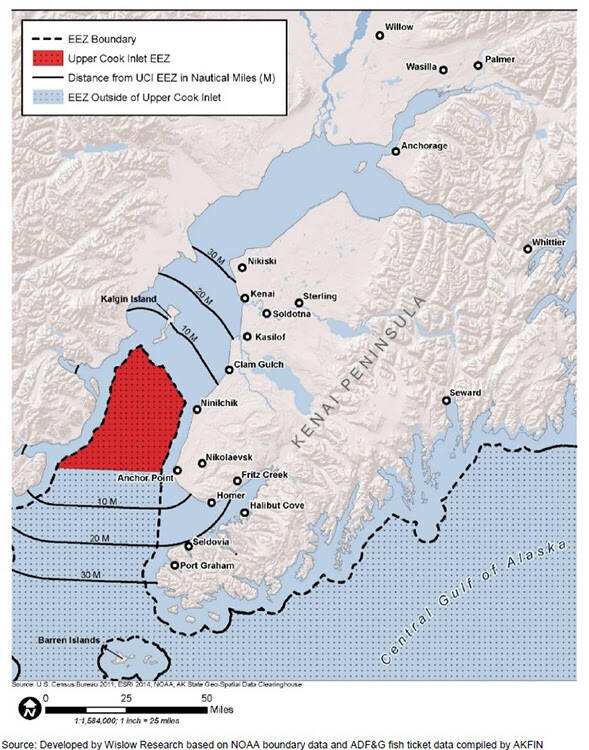Local fishermen are pushing back against the looming closure of Cook Inlet’s federal waters to commercial salmon fishing. The closure, scheduled to take effect Dec. 3, would close waters called the Exclusive Economic Zone, or EEZ, that run from south of Kalgin Island to about Anchor Point. It’s the fishing ground used by many of Cook Inlet’s drift fleet.
Wes Humbyrd, of Homer, started commercial fishing in the 1960s and said the closure of Cook Inlet’s federal waters to commercial salmon fishing will put him out of business. He’s one of three commercial fishermen being represented pro bono by the Pacific Legal Foundation, a nonprofit legal organization that focuses on cases dealing with what they say is government overreach.
Humbyrd has been fishing in Cook Inlet for 53 years and earns between 70% and 80% of his income by salmon fishing in Cook Inlet, primarily in federal waters. He said Monday that the closure of the EEZ to commercial salmon fishing will essentially shut down his operation.
“It’s just a travesty what they’ve done,” Humbyrd said.
Other plaintiffs include Robert Wolfe and Dan Anderson, both of whom are active commercial salmon fishermen in Cook Inlet.
Wolfe earns about 50% of his income from salmon fishing in Cook Inlet — mostly in federal waters — which he has done for 42 years, according to the case’s legal complaint. Anderson started his commercial fishing career in Cook Inlet as a deckhand in 1986 before launching his own vessel and permit in 1989.
Pacific Legal Foundation attorney Michael Poon, along with Damien M. Schiff and Oliver J. Dunford, are providing the fishermen with legal representation. Defendants named include U.S. Secretary of Commerce Gina Raimondo, National Marine Fisheries Service Assistant Administrator Janet Coit and the National Marine Fisheries Service.
Building their case
Poon said the legal foundation will focus on what they say is the unconstitutionality of how members of the North Pacific Fishery Management Council were appointed.
That council, which was created by the Magnuson-Stevens Fishery Conservation and Management Act, has 11 members. Seven of those members are nominated by the governors of Alaska and Washington, three are state officials from Alaska, Washington and Oregon and one is a National Marine Fisheries Service regional administrator.
Though Amendment 14 — which would close the EEZ to commercial salmon fishing — was approved for publication by the National Marine Fisheries Service, the Pacific Legal Foundation said the policy choice behind the rule was made by the North Pacific Fishery Management Council. Under the Magnuson-Stevens Act, the legal foundation says, the marine fisheries service must issue as a rule the proposal of the North Pacific Fishery Management Council as long as it is consistent with applicable law.
“The council thus decides the essential policy questions governing fishery management,” the legal complaint says. “Accordingly, council members wield power reserved for officers.”
The U.S. Constitution’s Appointments Clause says that “Officers of the United States” responsible for exercising federal power like rulemaking and policymaking, must be appointed by the president of the United States and then confirmed by the U.S. Senate.
Because members of the North Pacific Fishery Management Council were not appointed by the president and confirmed by the Senate, it was unconstitutional for them to propose the rule closing the EEZ, and therefore that rule is void, the firm says.
“Officials appointed in violation of the Constitution were never lawfully given their powers,” the Pacific Legal Foundation’s website about the case says. “So any actions they take have no legal effect and should be set aside. That includes the destructive regulation in this case.”
Poon said he could not comment on the anticipated legal strategy of the defendants.
Local action
Municipalities across the Kenai Peninsula have voiced their opposition to the closure of the EEZ.
That alternative drew criticism after the North Pacific Fishery Management Council voted in December 2020 to recommend closure of the water to commercial fishing as a “management plan.” In addition to saying the alternative was added late in the process, many were concerned about the potential economic harm.
The Kenai City Council and the Kenai Peninsula Borough have both been vocal opponents of the closure and have formalized their opposition in legislation sent to the Raimondo.
“Closing of the fishery in the EEZ does not provide the greatest opportunity for harvest, and while closure does protect salmon, minimize regulatory burden, and avoid additional management jurisdictions, other paths forward could accomplish the same without the potential harm to the fishery participants and communities that rely on and support the fishery,” legislation passed by the Kenai City Council this summer says.
Looking ahead
Poon said the priority of the case is to allow the plaintiffs to continue fishing in Cook Inlet’s federal waters, but that the case highlights problems in the appointment process that will also need to be reconciled.
“It is a problem that Congress has to address at some point,” Poon said.
Poon said the case is confined to the closure of the EEZ and that he doesn’t expect that a victory in the lawsuit would lead to the void of other rules proposed by the North Pacific Fishery Management Council because of the 30-day statute of limitations on challenging a rule prescribed by the Magnuson-Stevens Act.
Ultimately, Humbyrd said time is of the essence as it relates to the closure because “that’s where the fish are.” He wants to see the ruling vacated and for no fish to go to waste.
“They pushed us into a corner … , ” Humbyrd said. “We want our fishery back.”
Reach reporter Ashlyn O’Hara at ashlyn.ohara@peninsulaclarion.com.

